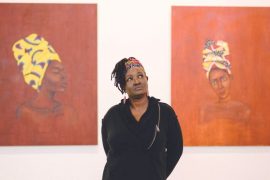Happiness
It's a Choice, Not an Elusive PerfectionWHAT IS HAPPINESS? A goal to be achieved, a journey to be taken or the little moments in life that light us up along the way? Is it possible for everyone to find a small bit of happiness in their lives? Here we ask four local experts to explore the idea of happiness, obstacles that jump in our way and tips for grasping this elusive feeling in our lives, even when it seems impossible.
First, to understand happiness, perhaps we should start with unhappiness, a feeling that is more common and more easily expressed in our chaotic, must-always-be-busy lives. That balled up emotion in the pit of our stomachs, the drain in energy, jealousy, anxiety, depression—so many emotions and states of mind lurch at us every day, often from places that are hidden within ourselves.
Tina Paulus-Krause, founder of TrueYou, a coaching business she describes as “a safe space for women to grow in mind, body and spirit,” says that most of us are very good at bottling up the bad things in our lives.
“Holding on to this negative energy manifests itself in ugly and toxic behaviors,” she explains. “This creates baggage that we take along each day and holds us back from living a healthy and happy life.”
And before anyone can define what happiness truly means to them, Paulus-Krause continues, they have to do the work to get rid of the baggage, release that weight that may be holding them back. Throw in an expectation of perfection bombarding us from social media and our culture in general, and that baggage gets even heavier. As societal pressures define how to act, dress and be, a picture forms in our heads of what that perfection is.
“We spend all of our energy trying to attain that perfection and it’s an impossible goal in the first place,” says Paulus-Krause. “Along the way, we feel unworthy, not smart enough, not happy or not pretty. So often we turn out our light and close ourselves off because we want that protection.”
As a licensed clinical psychologist, Dr. Christine Foskett often sees her patients struggle to find their inner selves, as that voice of truth gets crowded out early on as an individual learns to adapt to the world.
“Sometimes this inner self even gets split off and becomes a total stranger,” she says. “To begin to know your essential self, there may be a lot of emotional and psychic clutter that has to be weeded through.”
Understanding that there may be many false selves and masks that you have had to develop in order to survive your environment is a critical step in the journey toward finding the true you.
Teresa Atkins, certified master life coach, adds that women, especially, have a pact with each other to not act as if we are enjoying ourselves. Who’s the busiest, who’s the most stressed and who’s giving up more of their own happiness in service of doing for others?
But what if, just for a moment, we actually find pleasure, gratitude or peace in our lives? Does that mean we have to stop longing, yearning and striving for more?
The easy answer is that happiness is not so much about a destination or a tangible object that can be snatched out of the air, held closely and settled into like a warm blanket. As Foskett notes, this idea of happiness as a fleeting feeling is ego-based and dependent on achievement and outer circumstances.
“It’s a product of the choices that we make,” says Sarah Young, owner of Zing Collaborative and certified coach. “Happiness is something we create, every moment of every day through every choice that we make, in both big and small ways.”
But what is at the heart of happiness? Our experts used common words to describe what is often thought of as just a nebulous, unobtainable feeling: alignment, values, gratitude, self-understanding and authenticity. Getting past the clutter, releasing the baggage and digging into our true authentic selves is the first step to being open to happiness.
“I find that people often want a fast solution. They want someone else to fix them,” says Foskett. “They don’t want to accept the fact that some amount of suffering is an unavoidable part of life.”
Accepting that you may have to work through painful experiences or memories, and understanding that in some ways, these shape how you’ll be able to define happiness, allows for the transformation to occur.
When working with her coaching clients, Atkins often starts with visualization exercises to get below the radar of our thinking minds.
“For us to be really happy, we need to know ourselves very well and to do that we need to get past our emotional responses to our surroundings,” she says.
The pursuit of perfection, thinking that something external will be the pinnacle of happiness—that new car, bigger house, validation from our peers— is often the barrier to understanding who we really are and what brings us peace and confidence.
“When you bring your focus internal, and you start working on yourself—because you can only control yourself, right?—that brings accountability in,” says Paulus-Krause. “I think you’ll find that happiness is going to come from different places than you expected.” Young suggests that to start getting crystal clear on those values, we take a moment to reflect on each day. What does my daily life look like and where do those values show up or not show up? If there are values that are not reflected anywhere on my schedule how can I begin to incorporate them? “
And on the flip side, if my schedule is full of all these things that don’t align with my values where can I begin to say no, or delegate or transition so that I can begin to live a daily schedule that really aligns with my values?” says Young. Once you have a basic idea of those values, what lights you up, act in accordance with those values every minute of every day. Easier said than done as we are challenged with those creeping feelings—resentment, judgement, jealousy, selfdoubt—every day.
“Especially as women, there’s a bit of a rub between what we believe and what we feel and then how we show up at different parts of our lives,” says Young. “For example, I hear from a lot of women that around certain people at work, they have to say nothing when they want to say something, or they have to act in a way that doesn’t align with their values.”
Practicing to have the courage in both our professional and personal lives to say what we feel in a truthful, honest and compassionate way not only builds confidence, suggests Young, but gives us a sense of control over our own actions and feelings so that we don’t have those micromoments, where there’s dissonance between what we say or how we behave and what we actually value.
And what’s the easiest way to find those micro-moments of happiness each day? Gratitude. Again and again, our experts came back to this simple notion that often escapes us as we compare, judge and need more and more.
“Take five minutes to shut out the rest of the world and center yourself on those simple things that you have and can control,” says Paulus-Krause. “When you can find that gratefulness in the moment, it will always bring you back to happy, and bring you back to perspective and center.”
And then don’t be afraid to share it! Young notes it can be very vulnerable to convey to people that we are actually happy.
“But especially for women, it can be very powerful to be honest about that,” she says. “That doesn’t mean we have to brag or be arrogant, but we can give ourselves permission to be really happy or to have something joyful happen and share that with others without having to downplay it.”
Next time you catch yourself downplaying your happiness—something that you’ve worked hard to create—catch yourself in the act and stop to recognize it, embrace it and share it.



